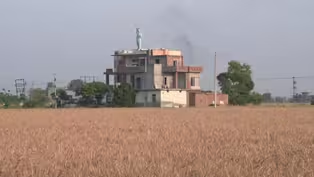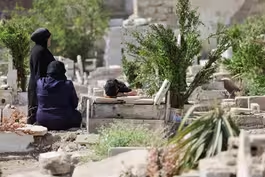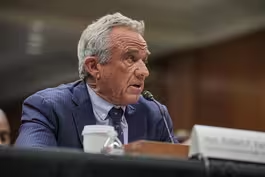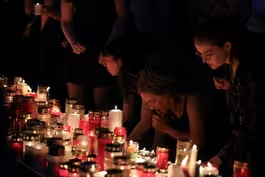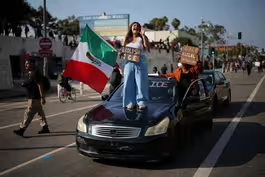
Retired military leaders analyze deployment in LA
Clip: 6/10/2025 | 8m 20sVideo has Closed Captions
Retired military leaders analyze Trump's deployment of Marines and National Guard in LA
For perspective on the Trump administration’s deployment of active duty Marines to Los Angeles and the federal call-up of the National Guard, Geoff Bennett spoke with James McPherson, an under secretary of the Army during the first Trump administration, and retired Maj. Gen. David Baldwin, the top military commander of National Guard forces in California from 2011-2022.
Problems playing video? | Closed Captioning Feedback
Problems playing video? | Closed Captioning Feedback
Major corporate funding for the PBS News Hour is provided by BDO, BNSF, Consumer Cellular, American Cruise Lines, and Raymond James. Funding for the PBS NewsHour Weekend is provided by...

Retired military leaders analyze deployment in LA
Clip: 6/10/2025 | 8m 20sVideo has Closed Captions
For perspective on the Trump administration’s deployment of active duty Marines to Los Angeles and the federal call-up of the National Guard, Geoff Bennett spoke with James McPherson, an under secretary of the Army during the first Trump administration, and retired Maj. Gen. David Baldwin, the top military commander of National Guard forces in California from 2011-2022.
Problems playing video? | Closed Captioning Feedback
How to Watch PBS News Hour
PBS News Hour is available to stream on pbs.org and the free PBS App, available on iPhone, Apple TV, Android TV, Android smartphones, Amazon Fire TV, Amazon Fire Tablet, Roku, Samsung Smart TV, and Vizio.
Providing Support for PBS.org
Learn Moreabout PBS online sponsorshipGEOFF BENNETT: For perspective now on the Trump administration's deployment of active-duty Marines to Los Angeles and the federal call-up of the National Guard, we get two views.
James McPherson was the undersecretary of the Army during the first Trump administration.
He also had a 25-year career in the Navy and served as that service's top lawyer in uniform.
And retired Major General David Baldwin was the top military commander of the National Guard forces in California from 2011 to 2022.
Gentlemen, thank you for being with us.
Jim McPherson, I want to start with you, because Homeland Security Secretary Kristi Noem said today that deploying active-duty Marines to L.A. was the right call because, in her words, they're specifically trained to meet the need on the ground.
Is that the case?
Are combat Marines really what's needed?
REAR ADM. JAMES MCPHERSON (RET.
), Former U.S.
Undersecretary of the Army: Well, I would respectfully disagree with the secretary.
Combat Marines are trained and exercise in just that, engaging in ground combat.
They're not trained and they do not exercise in crowd control or de-escalation or things like that.
Now, we have heard from NORTHCOM that they have received that training, but I would ask, what was the level of that training?
Was it just an hour-long briefing with a handout?
Or did they actually go through the sort of training that M.P.s go through to include, as General Baldwin knows, the California National Guard M.P.s, who do train and who do exercise in crowd control?
Marines are not trained to do that.
They're trained to engage in combat.
GEOFF BENNETT: David Baldwin, how do you see it?
And drawing on your experience, what do you make of President Trump's decision to federalize the National Guard over the objections of California's governor?
MAJ. GEN. DAVID BALDWIN (RET.
), U.S. National Guard: Federalizing the National Guard for use domestically is always a suboptimal solution.
The National Guard works best when it's under state control and can work hand in glove with its law enforcement partners at the state and local level.
Federalization of the Guard creates a lot of challenges.
It very much limits the roles and authority that Guardsmen can use when they execute civil support missions like this one.
Ostensibly, the Guard was brought in, as they say, to be able to protect federal law enforcement officers.
And it may have been a very expedient solution, but, as the secretary said, it probably wasn't the best solution.
You know, you could bring in other federal agents from around the country to come in to execute that task.
So it's a little bit heavy-handed to bring the Guard in and the Marines, especially when it's over the objection of the governor of the state and indeed without the request from the law enforcement leaders on the ground, like Chief McDonnell and the sheriff of Los Angeles.
GEOFF BENNETT: Jim McPherson, you mentioned the rules of engagement that were issued by NORTHCOM.
We should explain that the Northern Command is the combatant control -- the combatant commands, rather, responsible for securing the homeland.
And they told our team that the rules of engagement are still being finalized, but that -- this is a quote -- "Service members are trained in de-escalation techniques and always retain the inherent right to self-defense to a hostile act or demonstrated hostile intent."
Meantime, you got the president.
He tweeted: "If they spit, we will hit."
Is that an appropriate framework for rules of engagement?
REAR ADM. JAMES MCPHERSON (RET.).
: I'm a little surprised that this spokesperson for NORTHCOM would use the term rules of engagement.
Rules of engagement are defined as the circumstances and the limitations that U.S. forces can initiate or continue combat engagement.
Rules of engagement are designed for combat engagement.
What these Marines and the National Guard will be acting under are called rules for the use of force.
They are very, very different.
The other thing that I was very surprised about is, in their statement, they use the word hostile intent.
Hostile intent has no play with regard to rules for the use of force.
It does play with regard to rules of engagement.
Again, I'm very surprised that the spokesperson for NORTHCOM would confuse those terms.
GEOFF BENNETT: David Baldwin, question for you about the National Guard.
When they're activated by the governor for in-state missions, how closely do they typically coordinate with state and local law enforcement?
And do you have any questions about the level of coordination happening now?
MAJ. GEN. DAVID BALDWIN (RET.
): When activated under state control, the Guard works very closely, because, after all, our mission is to support those federal law enforcement -- or correction state law enforcement officials and local law enforcement officials on the ground.
We deploy liaisons at all level of their command to match the levels of our command, to make sure that we are quite closely synchronized because, as Chief McDonnell spoke earlier during the program, about how complicated it is to exercise control during events like this.
As far as coordination between the federalized National Guard and the Marine Corps, I'm hopeful that they have liaisons deployed to the civilian law enforcement agencies that are not federal, so LAPD and L.A. Sheriff and the surrounding communities.
I don't know if they have done that or not.
It would be prudent for them to do so.
But I do know that the National Guard is working very closely with the federal law enforcement agencies that they have been tasked to support.
GEOFF BENNETT: And, Jim McPherson, you told our team that you believe the Trump administration wants to see violence escalate in California, because that would be the predicate for the president to invoke the Insurrection Act.
Tell me more about that.
REAR ADM. JAMES MCPHERSON (RET.).
: Well, I think it's unfortunate that this has become so politicized.
I believe that it played into their playbook that this occurred in Los Angeles in California, with a Democratic governor who's going to run for president.
And I think the push here is that they will send in these armed forces who, quite frankly, are not the right mix of people to be engaged with the public.
And there's going to be an escalation.
There's going to be an unfortunate incident, as there was in 1997 on the Texas border, when a similar occurrence occurred.
Marines were there to provide surveillance, and they ended up shooting and killing a local teenager who was herding sheep.
I think there's going to be that escalation.
And when that escalation occurs, I'm afraid the president is going to invoke the Insurrection Act, and we're going to have uniformed service members enforcing the law upon U.S. citizens, something that just shouldn't occur.
GEOFF BENNETT: David Baldwin, do you share that concern about escalation?
MAJ. GEN. DAVID BALDWIN (RET.
): First, I have faith and confidence in the initiative, the training, and the perspective of the young soldiers and Marines that we have tasked to do this mission.
I have great faith in the chain of command and the leadership.
However, as the secretary mentioned, things can spin out of control.
And, unfortunately, in very tense situations, when people get tired and things start to happen, if someone makes a decision that their life is threatened or a federal officer's life is threatened and they choose to use deadly force, that becomes a very unfortunate incident that will escalate and cause a lot of problems.
And, now, that can, of course, happen with the law enforcement officers also, but law enforcement officers are much better trained for this than even National Guardsmen and, of course, the Marines that are on the ground.
GEOFF BENNETT: And, Jim McPherson, in your view, did local officials need the help from the National Guard in the first place?
REAR ADM. JAMES MCPHERSON (RET.).
: Well, according to reports on the ground and the report we just heard from your report from Los Angeles, it seems to be very localized.
I'm not sure the governor nor the local authorities requested National Guard assistance.
And when that assistance comes, I just don't see that it was necessary at the time.
I think that was an initial escalation.
And, again, while I agree with the general and have confidence in the chain of command and those forces, I just think this is going to escalate out of control, and we're going to have the Insurrection Act come into play, which is very unfortunate.
GEOFF BENNETT: Admiral James McPherson and Major General David Baldwin, we thank you both for your time and for your insights this evening.
REAR ADM. JAMES MCPHERSON (RET.).
: Thank you.
MAJ. GEN. DAVID BALDWIN (RET.
): Thank you.
The costly journey Indian migrants face to reach the U.S.
Video has Closed Captions
Clip: 6/10/2025 | 9m 23s | The risky and costly journey Indian migrants face to reach the U.S. (9m 23s)
Daughter of American on the search for his remains in Syria
Video has Closed Captions
Clip: 6/10/2025 | 6m 10s | Daughter of American killed in Syria describes the fight to find his remains (6m 10s)
Ex-CDC director reacts to firing of vaccine advisory panel
Video has Closed Captions
Clip: 6/10/2025 | 7m 23s | Former CDC director reacts to RFK Jr.'s firing of entire vaccine advisory panel (7m 23s)
News Wrap: Gunman kills 10 at school in Austria
Video has Closed Captions
Clip: 6/10/2025 | 5m 45s | News Wrap: Gunman kills 10 at school in Austria (5m 45s)
Smithsonian board rejects Trump's attempt to fire top leader
Video has Closed Captions
Clip: 6/10/2025 | 6m 45s | Smithsonian board rejects Trump's attempt to fire top leader (6m 45s)
Troops deployed in LA as immigration raids stir protests
Video has Closed Captions
Clip: 6/10/2025 | 8m 41s | Troops deployed in LA as immigration raids stir fear and protests (8m 41s)
Providing Support for PBS.org
Learn Moreabout PBS online sponsorshipSupport for PBS provided by:
Major corporate funding for the PBS News Hour is provided by BDO, BNSF, Consumer Cellular, American Cruise Lines, and Raymond James. Funding for the PBS NewsHour Weekend is provided by...
